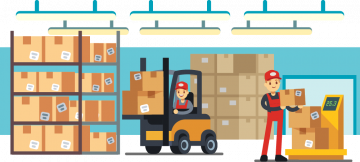Still Exploring?
Looks like you’ve been exploring our platform.
Want to see everything in one place?

The Countering America’s Adversaries Through Sanctions Act (CAATSA) is a U.S. federal law that imposes economic sanctions on Iran, Russia and North Korea. The bill came into effect on August 2, 2017, with the intention of countering perceived aggressions against the U.S. government by foreign powers. It accomplishes this goal by preventing U.S. companies from doing business with sanctioned entities.
The complete list of entities affected by the act can be found in the Office of Foreign Assets Control (OFAC)’s Specially Designated Nationals and Blocked Persons List.

Under CAATSA, companies found to be knowingly engaging in activities that contribute materially to listed entities will be in violation of trade sanctions. This includes companies exporting goods, services and intellectual property, and companies importing goods, wares, merchandise and articles into the U.S. Companies in violation of sanctions are required to institute and maintain robust denied parties screening programs and overall due diligence regarding business with sanctioned entities. This includes assessing and mitigating risks of forced labor, corruption and cybersecurity abuses in supply chains.
To demonstrate reasonable due diligence in compliance with CAATSA, the U.S. Department of Homeland Security recommends that companies do the following:
Trade sanction violations must be reported to U.S. Customs and Border Protection (CBP). Where human rights violations are involved, they must also be submitted to the Immigration and Customs Enforcement (ICE) forced labor intake point.
Violating the terms of any particular provision may result in additional penalties specific to that provision. For example, violations of the North Korean Forced Labor Sanction can include civil monetary penalties at either double the value of the goods transaction, or $295,141 USD per violation, with the option to recommend criminal prosecution.
CAATSA violations can result in the following measures:

CAATSA Title III Section 321 (b) introduced serious and immediate sanctions risk to businesses with supply chain links to North Korea. This section of CAATSA creates a rebuttable presumption that goods, wares, merchandise and articles mined, produced or manufactured in whole or in part by a North Korean national or citizen anywhere in the world are forced-labor goods, and are therefore prohibited from importation into the U.S. under the Tariff Act of 1930.
The two key sanction risks for any company in scope of CAATSA Section 321 (b) are the “inadvertent sourcing of goods, services and technology from North Korea,” and the “presence of North Korean citizens or nationals in companies’ supply chains, whose labor generates revenue for the North Korean government.” The sanctions apply to any goods imported into the U.S., whether in whole or in part. This means the risk of economic sanctions violations apply to any part, material or process associated with North Korean labor, either within the country or abroad, and at any stage in the sourcing, production or manufacturing of goods.